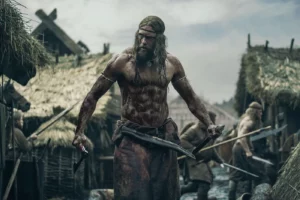The Northman (2022) review
Dir. Robert Eggers
By: Steve Pulaski
Rating: ★★★
In 895 AD, on a remote island in Iceland, King Aurvandil (Ethan Hawke) returns from war. He reunites with his wife, Queen Gudrún (Nicole Kidman) and his young son, Amleth (Oscar Novak). With the help of court jester Heimir (a feral Willem Dafoe), Aurvandil initiates a ritual for the young Prince that allows him to tap into his cold, callous inner wolf. It’s a move that comes at an impeccable time because shortly after, Aurvandil is murdered by his brother, Fjölnir (Claes Bang). Amleth flees in a rowboat, screaming his vows for revenge and familial honor with every stroke.
Amleth turns into a hulking beast of a human in adulthood. Played by Alexander Skarsgård, the prince is taken as a slave and sold to Fjölnir, now in command of a small but mighty army in exiled Iceland. He’s unrecognizable from the boyish demeanor he harbored the last time his uncle laid eyes on him. En route to exact revenge on Fjölnir and his family, Amleth falls for Olga (Anya Taylor-Joy), a potion-maker also in captivity. Pointed revelations on his way to honoring his father in the most sinful of ways make this quest harder. Amleth is no less a warrior, never made to reconsider the lifelong course on which he set.
The Northman is Robert Eggers’ first mainstream work and it feels like a natural progression for the New England filmmaker. Eggers’ debut, The Witch, was a supernatural folktale that’s style too often usurped the presence of substance. His sophomore effort, The Lighthouse, was a salty take on Greek mythology that benefited from richly realized German expressionism in both look and story. Eggers has long been captivated not only by folklore but by the inherent weirdness of tales that are passed on by generations and reimagined in translation.
With his largest budget to date (over $70 million) and a deep pool of performers, Eggers’ has graduated in his career without compromising his vision — a laudable feat in this economy. Specifically, his camerawork has increased movement. Seen early, Eggers employs complex tracking shots during the sequence where Amleth clashes with a small army of bearskin-clad Vikings. His upgraded techniques can’t lose with excellent editing by Louise Ford, who affords that sequence and most others with the clarity necessary for them to have impact. Ford too knows when to linger on certain moments; be it a young Amleth rowing aimless yet determinedly through uncharted waters or characters traversing the countryside.
Jarin Blaschke (Eggers’ choice cinematographer, now their third collaboration) remains true to Eggers’ love for dark, sometimes distorted visuals; seen no better than in dimly lit caves that are the ideal location for rituals or carefully conceived backstory. Here, fire is the only source of illumination, creating a smoky background that only dials up the ominous nature of this Viking tale.
Working with Icelandic poet Sjón (Lamb), Eggers crafts a bloody, muddy, and at times disturbing picture. Themes of violence begetting violence and how a life built on hatred and vengeance uncovers secrets best left as accepted unknowns are simple enough to carry a movie that succeeds foremost through an arsenal of engaged performances and ceaseless brutality. If The Northman falters in any significant way, it’s that Eggers and Sjón feel bound to popular works. If you haven’t yet picked up on it, take another look at the name Amleth and decode it. Think Shakespeare.
There are other small bones to pick. Similar to Guillermo del Toro’s Nightmare Alley, Eggers does tease us a bit by giving us Ethan Hawke and Willem Dafoe in the beginning of the movie — both looking primed to make another statement in their beautifully eccentric filmographies — only to discard them about as swiftly as they’re introduced. Björk’s Seeress is another deliciously weird prophet-esque character who could’ve used another scene or two. This is not a criticism towards Skarsgård and Taylor-Joy, two of the more underappreciated actors as far as I’m concerned. They assimilate into Eggers’ strangeness like the naturals they are.
The most common point of comparison might inevitably be David Lowery’s The Green Knight from last year. However, where Lowery was just as interested in deconstructing the mythmaking around King Arthur as he was in offering a cerebral interpretation of a well-known story, Eggers’ film features much more accessible on the surface. That’s both a positive and a negative. The careful world-building by him and Sjón allows those unfamiliar with such texts an easy entrance point into the material. The two just don’t quite penetrate the themes as deeply as they could.
An example is in how the film flirts with the idea of giving Olga and the other female slaves a tangible arc yet keeps circling back to a wolf/warrior’s bloodlust. As the third act slightly labors, with more than a couple false endings and the kind of small details you feel Eggers would’ve wiped away in the past, the surface nature of The Northman does become more apparent. In a morally bankrupt society where men are bred from a young age to kill or be killed, such simplicity is understandable, if slightly underwhelming.
NOTE: The Northman is now playing exclusively in theaters.
OTHER REVIEWS OF ROBERT EGGERS FILMS:
My review of The Witch
My review of The Lighthouse
My review of Nosferatu (2024)
Starring: Alexander Skarsgård, Anya Taylor-Joy, Nicole Kidman, Claes Bang, Ethan Hawke, Björk, and Willem Dafoe. Directed by: Robert Eggers.
About Steve Pulaski
Steve Pulaski has been reviewing movies since 2009 for a barrage of different outlets. He graduated North Central College in 2018 and currently works as an on-air radio personality. He also hosts a weekly movie podcast called "Sleepless with Steve," dedicated to film and the film industry, on his YouTube channel. In addition to writing, he's a die-hard Chicago Bears fan and has two cats, appropriately named Siskel and Ebert!


